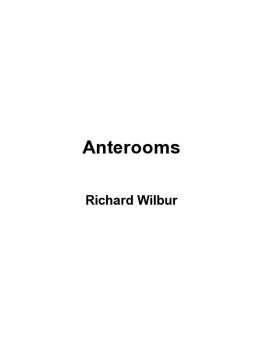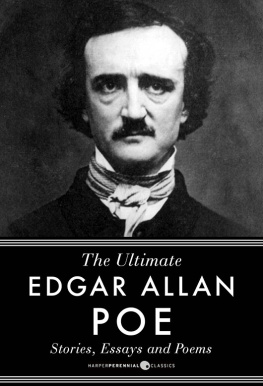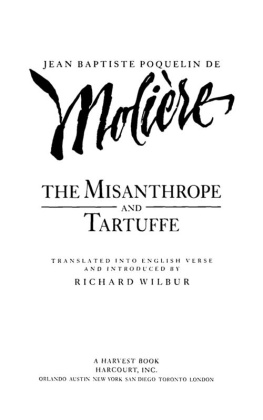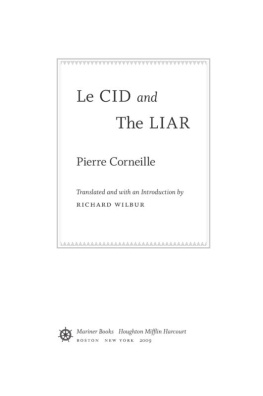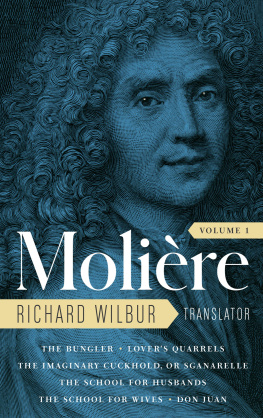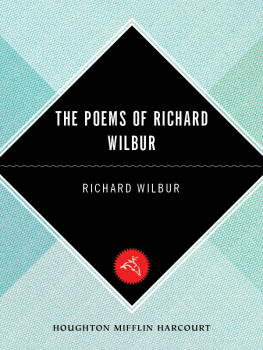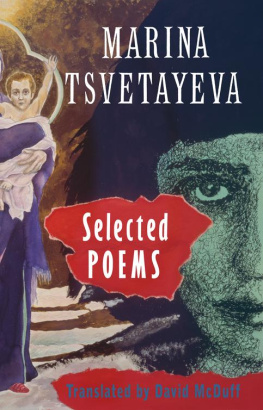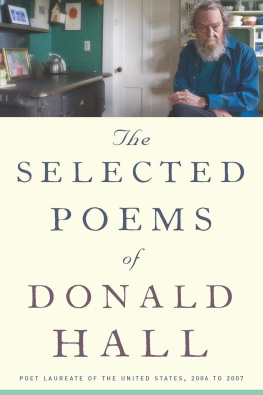Copyright 2010 by Richard Wilbur
ALL RIGHTS RESERVED
For information about permission to reproduce
selections from this book, write to Permissions,
Houghton Mifflin Harcourt Publishing Company,
215 Park Avenue South, New York, New York 10003.
www.hmhbooks.com
Library of Congress Cataloging-in-Publication Data
Wilbur, Richard, date.
Anterooms : new poems and translations / Richard Wilbur.
p. cm.
ISBN 978-0-547-35811-6
I. Title.
PS 3545. I 32165 A 8 2010
811'.52dc22 2010005772
Book design by Melissa Lotfy
Printed in the United States of America
DOC 10 9 8 7 6 5 4 3 2 1
Some of these poems have appeared in The New Yorker, Poetry, the Atlantic, the Yale Review, First Things, the Hopkins Review, the Raintown Review, the Alabama Literary Review, and the Riverbank Review. In translating the riddles of Symphosius, I have been indebted (as always) to the scholarship of Raymond Theodore Ohl, and my poem "Trismegistus" is similarly indebted to Frances Yates. Daniel Hoffman's translation of Mallarm's "Tombeau d'Edgar Poe" was published before mine, and I suspect that I owe him thanks for a crucial rhyme in the sestet. The unpublished fragment of Verlaine, included here, has been on deposit in the Houghton Library at Harvard; Stephen Sandy invited me to translate it for publication by the White Creek Press.
The House
Sometimes, on waking, she would close her eyes
For a last look at that white house she knew
In sleep alone, and held no title to,
And had not entered yet, for all her sighs.
What did she tell me of that house of hers?
White gatepost; terrace; fanlight of the door;
A widow's walk above the bouldered shore;
Salt winds that ruffle the surrounding firs.
Is she now there, wherever there may be?
Only a foolish man would hope to find
That haven fashioned by her dreaming mind.
Night after night, my love, I put to sea.
I
A Measuring Worm
This yellow-striped green
Caterpillar, climbing up
The steep window screen,
Constantly (for lack
Of a full set of legs) keeps
Humping up his back.
It's as if he sent
By a sort of semaphore
Dark omegas meant
To warn of Last Things.
Although he doesn't know it,
He will soon have wings,
And I too don't know
Toward what undreamt condition
Inch by inch I go.
Flying
Treetops are not so high
Nor I so low
That I don't instinctively know
How it would be to fly
Through gaps that the wind makes, when
The leaves arouse
And there is a lifting of boughs
That settle and lift again.
Whatever my kind may be,
It is not absurd
To confuse myself with a bird
For the space of a reverie:
My species never flew,
But I somehow know
It is something that long ago
I almost adapted to.
Psalm
Give thanks for all things
On the plucked lute, and likewise
The harp of ten strings.
Have the lifted horn
Greatly blare, and pronounce it
Good to have been born.
Lend the breath of life
To the stops of the sweet flute
Or capering fife,
And tell the deep drum
To make, at the right juncture,
Pandemonium.
Then, in grave relief,
Praise too our sorrows on the
Cello of shared grief.
Young Orchard
These trees came to stay.
Planted at intervals of
Thirty feet each way,
Each one stands alone
Where it is to live and die.
Still, when they have grown
To full size, these trees
Will blend their crowns, and hum with
Mediating bees.
Meanwhile, see how they
Rise against their rootedness
On a gusty day,
Nodding one and all
To one another, as they
Rise again and fall,
Swept by flutterings
So that they appear a great
Consort of sweet strings.
Anterooms
Out of the snowdrift
Which covered it, this pillared
Sundial starts to lift,
Able now at last
To let its frozen hours
Melt into the past
In bright, ticking drops.
Time so often hastens by,
Time so often stops
Still, it strains belief
How an instant can dilate,
Or long years be brief.
Dreams, which interweave
All our times and tenses, are
What we can believe:
Dark they are, yet plain,
Coming to us now as if
Through a cobwebbed pane
Where, before our eyes,
All the living and the dead
Meet without surprise.
Trismegistus
O Egypt, Egypt so the great lament
Of thrice-great Hermes went
Nothing of thy religion shall remain
Save fables, which thy children shall disdain.
His grieving eye foresaw
The world's bright fabric overthrown
Which married star to stone
And charged all things with awe.
And what, in that dismantled world, could be
More fabulous than he?
Had he existed? Was he but a name
Tacked on to forgeries which pressed the claim
Of every ancient quack
That one could from a smoky cell
By talisman or spell
Coerce the Zodiac?
Still, still we summon him at midnight hour
To Milton's pensive tower,
And hear him tell again how, then and now,
Creation is a house of mirrors, how
Each herb that sips the dew
Dazzles the eye with many small
Reflections of the All
Which, after all, is true.
Terza Rima
In this great form, as Dante proved in Hell,
There is no dreadful thing that can't be said
In passing. Here, for instance, one could tell
How our jeep skidded sideways toward the dead
Enemy soldier with the staring eyes,
Bumping a little as it struck his head,
And then flew on, as if toward Paradise.
Galveston, 1961
You who in crazy-lensed
Clear water fled your shape,
By choppy shallows flensed
And shaken like a cape,
Who gently butted down
Through weeds, and were unmade,
Piecemeal stirring your brown
Legs into stirred shade,
And rose, and with pastel
Coronas of your skin
Stained swell on glassy swell,
Letting them bear you in:
Now you have come to shore,
One woman and no other,
Sleek Panope no more,
Nor the vague sea our mother.
Shake out your spattering hair
And sprawl beside me here,
Sharing what we can share
Now that we are so near,
Small-talk and speechless love
Mine being all but dumb
That knows so little of
What goddess you become
And still half-seem to be,
Though close and clear you lie,
Whom droplets of the sea
Emboss and magnify.
A Pasture Poem
This upstart thistle
Is young and touchy; it is
All barb and bristle,
Threatening to wield
Its green, jagged armament
Against the whole field.
Butterflies will dare
Nonetheless to lay their eggs
In that angle where
The leaf meets the stem,
So that ants or browsing cows
Cannot trouble them.
Summer will grow old
As will the thistle, letting
A clenched bloom unfold
To which the small hum
Of bee-wings and the flash of
Goldfinch-wings will come,
Till its purple crown
Blanches, and the breezes strew
The whole field with down.
Ecclesiastes 11:1
We must cast our bread
Upon the waters, as the
Ancient preacher said,
Trusting that it may
Amply be restored to us
After many a day.
That old metaphor,
Drawn from rice-farming on the
River's flooded shore,
Helps us to believe
That it's no great sin to give,
Hoping to receive.
Therefore I shall throw
Broken bread, this sullen day,
Out across the snow,
Betting crust and crumb
Next page
